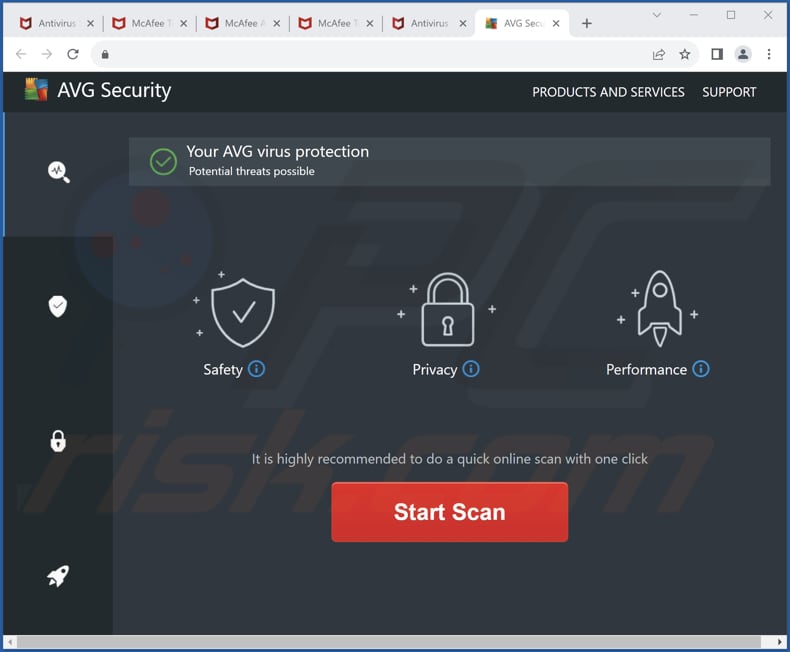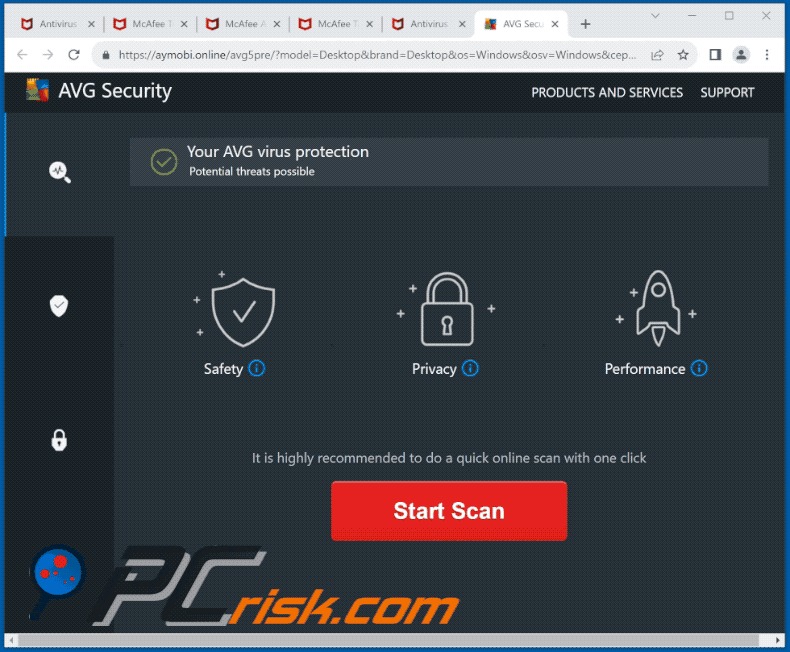How to avoid falling for scams like "AVG Security" pop-up scam
Phishing/ScamAlso Known As: AVG Security scam
Get free scan and check if your device is infected.
Remove it nowTo use full-featured product, you have to purchase a license for Combo Cleaner. Seven days free trial available. Combo Cleaner is owned and operated by RCS LT, the parent company of PCRisk.com.
What is "AVG Security" scam?
While investigating this webpage, we found that it shows misleading messages to trick visitors into believing their computers are infected. It is important to stay away from such sites, as they are made to steal money, information or for other malicious purposes. Typically, users end up on these websites by accident.

"AVG Security" scam in detail
After being accessed, this webpage displays a message advising users to perform a fast online scan and presents a "Start Scan" button. If this button is clicked, a simulated AVG scan begins (AVG is a legitimate security tool not officially related to this misleading page).
Upon running a fake scan, the page indicates significant privacy breaches and potential security threats, including a compromised Chrome browser, numerous privacy breaches, an unsafe Internet connection, and the presence of a Trojan horse, malware, and spyware. It strongly advises users to promptly utilize AVG antivirus protection at a cost of $2.08 per month.
This deceptive page appears to serve as a platform for affiliates to promote legitimate software, such as AVG antivirus. However, the affiliation between the deceptive page and AVG might not be genuine, and users could unknowingly fall into a trap where they end up paying for a service that might not provide the expected level of protection.
Either way, it is strongly recommended not to trust websites claiming that your computer is infected and close them. Sometimes, these sites may be used to deliver malware or other unwanted software (e.g., adware) or steal money or sensitive information (e.g., credit card details or passwords).
| Name | AVG Security scam |
| Threat Type | Phishing, Scam, Social Engineering, Fraud |
| Fake Claim | Threats have been detected on a computer |
| Disguise | Legitimate AVG website |
| Related Domain | aymobi[.]online |
| Detection Names (aymobi[.]online) | Avira (Malware), Combo Cleaner (Malware), CRDF (Malicious), Kaspersky (Phishing), Sophos (Phishing), Full List Of Detections (VirusTotal) |
| Symptoms | Fake error messages, fake system warnings, pop-up errors, hoax computer scan. |
| Distribution methods | Compromised websites, rogue online pop-up ads, potentially unwanted applications. |
| Damage | Loss of sensitive private information, monetary loss, identity theft, possible malware infections. |
| Malware Removal (Windows) |
To eliminate possible malware infections, scan your computer with legitimate antivirus software. Our security researchers recommend using Combo Cleaner. Download Combo CleanerTo use full-featured product, you have to purchase a license for Combo Cleaner. 7 days free trial available. Combo Cleaner is owned and operated by RCS LT, the parent company of PCRisk.com. |
Similar scams in general
Deceptive pages running pop-up scams are designed to manipulate users into believing false information or engaging in actions that are not in their best interest. These pages often mimic legitimate websites or services, employing persuasive messages, urgent calls to action, and sometimes even imitating trusted brands or products.
They aim to exploit users' trust and induce them to make hasty decisions, such as purchasing products, sharing personal information, or downloading software, which may lead to financial loss, privacy breaches, or malware infections.
Examples of pop-up scams are "Clop Ransomware.dll POP-UP Scam", "YOUR DEVICE MAY BE COMPROMISED POP-UP Scam", and "Total AV Security - Your Smartphone Is Infected POP-UP Scam".
How did I open a scam website
Users might accidentally access fraudulent websites by interacting with malicious ads or pop-ups that lead to these sites, including notifications from untrustworthy sources. Phishing emails could also include links to these deceitful websites, deceiving users into clicking on them. Additionally, adware could serve as a conduit for promoting scams.
In other scenarios, users might come across scam websites when they visit pages connected to rogue advertising networks. These networks are commonly associated with unauthorized movie streaming websites, torrent platforms, adult content sites, and similar pages.
How to avoid visiting scam pages?
Refrain from opening links in suspicious emails or ads on dubious websites. Do not permit questionable pages to send notifications. Regularly scan your computer for adware and unwanted software. Steer clear of sites that could be associated with rogue advertising networks. When downloading apps, rely on official sources and stores.
If your computer is already infected with unwanted apps, we recommend running a scan with Combo Cleaner Antivirus for Windows to automatically eliminate them.
The appearance of "AVG Security" pop-up scam (GIF):

Text in this page:
AVG Security
PRODUCTS AND SERVICES SUPPORT
Your AVG virus protection
Potential threats possibleSafety Privacy Performance
It is highly recommended to do a quick online scan with one click
[Start Scan]
Instant automatic malware removal:
Manual threat removal might be a lengthy and complicated process that requires advanced IT skills. Combo Cleaner is a professional automatic malware removal tool that is recommended to get rid of malware. Download it by clicking the button below:
DOWNLOAD Combo CleanerBy downloading any software listed on this website you agree to our Privacy Policy and Terms of Use. To use full-featured product, you have to purchase a license for Combo Cleaner. 7 days free trial available. Combo Cleaner is owned and operated by RCS LT, the parent company of PCRisk.com.
Quick menu:
- What is AVG Security scam?
- How to identify a pop-up scam?
- How do pop-up scams work?
- How to remove fake pop-ups?
- How to prevent fake pop-ups?
- What to do if you fell for a pop-up scam?
How to identify a pop-up scam?
Pop-up windows with various fake messages are a common type of lures cybercriminals use. They collect sensitive personal data, trick Internet users into calling fake tech support numbers, subscribe to useless online services, invest in shady cryptocurrency schemes, etc.
While in the majority of cases these pop-ups don't infect users' devices with malware, they can cause direct monetary loss or could result in identity theft.
Cybercriminals strive to create their rogue pop-up windows to look trustworthy, however, scams typically have the following characteristics:
- Spelling mistakes and non-professional images - Closely inspect the information displayed in a pop-up. Spelling mistakes and unprofessional images could be a sign of a scam.
- Sense of urgency - Countdown timer with a couple of minutes on it, asking you to enter your personal information or subscribe to some online service.
- Statements that you won something - If you haven't participated in a lottery, online competition, etc., and you see a pop-up window stating that you won.
- Computer or mobile device scan - A pop-up window that scans your device and informs of detected issues - is undoubtedly a scam; webpages cannot perform such actions.
- Exclusivity - Pop-up windows stating that only you are given secret access to a financial scheme that can quickly make you rich.
Example of a pop-up scam:

How do pop-up scams work?
Cybercriminals and deceptive marketers usually use various advertising networks, search engine poisoning techniques, and shady websites to generate traffic to their pop-ups. Users land on their online lures after clicking on fake download buttons, using a torrent website, or simply clicking on an Internet search engine result.
Based on users' location and device information, they are presented with a scam pop-up. Lures presented in such pop-ups range from get-rich-quick schemes to fake virus scans.
How to remove fake pop-ups?
In most cases, pop-up scams do not infect users' devices with malware. If you encountered a scam pop-up, simply closing it should be enough. In some cases scam, pop-ups may be hard to close; in such cases - close your Internet browser and restart it.
In extremely rare cases, you might need to reset your Internet browser. For this, use our instructions explaining how to reset Internet browser settings.
How to prevent fake pop-ups?
To prevent seeing pop-up scams, you should visit only reputable websites. Torrent, Crack, free online movie streaming, YouTube video download, and other websites of similar reputation commonly redirect Internet users to pop-up scams.
To minimize the risk of encountering pop-up scams, you should keep your Internet browsers up-to-date and use reputable anti-malware application. For this purpose, we recommend Combo Cleaner Antivirus for Windows.
What to do if you fell for a pop-up scam?
This depends on the type of scam that you fell for. Most commonly, pop-up scams try to trick users into sending money, giving away personal information, or giving access to one's device.
- If you sent money to scammers: You should contact your financial institution and explain that you were scammed. If informed promptly, there's a chance to get your money back.
- If you gave away your personal information: You should change your passwords and enable two-factor authentication in all online services that you use. Visit Federal Trade Commission to report identity theft and get personalized recovery steps.
- If you let scammers connect to your device: You should scan your computer with reputable anti-malware (we recommend Combo Cleaner Antivirus for Windows) - cyber criminals could have planted trojans, keyloggers, and other malware, don't use your computer until removing possible threats.
- Help other Internet users: report Internet scams to Federal Trade Commission.
Frequently Asked Questions (FAQ)
What is a pop-up scam?
Pop-up scams involve misleading messages crafted to trick users into carrying out specific actions. Typically, pop-up scams use alarming messages (e.g., fake warnings).
What is the purpose of a pop-up scam?
Pop-up scams are primarily employed for monetary gain, with scammers seeking profits through tactics like fraudulent fund acquisition, the illicit sale or misuse of sensitive information, content promotion, and the dissemination of malware.
Why do I encounter fake pop-ups?
Visitors often access pages running pop-up scams through redirects triggered by sites employing rogue advertising networks, mistyped URLs, intrusive advertisements, unsolicited browser notifications, or installed adware.
Will Combo Cleaner protect me from pop-up scams?
Yes, Combo Cleaner is created to identify and remove various threats, scan websites for malicious content, and block access to deceptive or hazardous pages.
Share:

Tomas Meskauskas
Expert security researcher, professional malware analyst
I am passionate about computer security and technology. I have an experience of over 10 years working in various companies related to computer technical issue solving and Internet security. I have been working as an author and editor for pcrisk.com since 2010. Follow me on Twitter and LinkedIn to stay informed about the latest online security threats.
PCrisk security portal is brought by a company RCS LT.
Joined forces of security researchers help educate computer users about the latest online security threats. More information about the company RCS LT.
Our malware removal guides are free. However, if you want to support us you can send us a donation.
DonatePCrisk security portal is brought by a company RCS LT.
Joined forces of security researchers help educate computer users about the latest online security threats. More information about the company RCS LT.
Our malware removal guides are free. However, if you want to support us you can send us a donation.
Donate
▼ Show Discussion